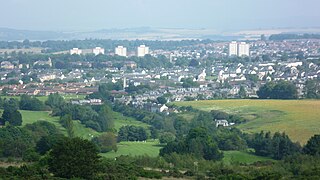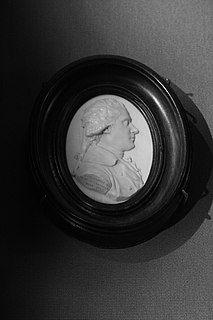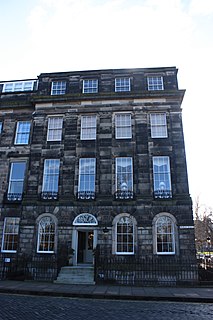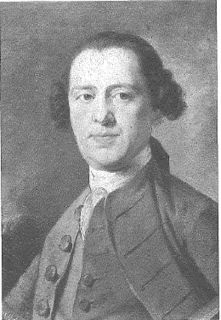Related Research Articles

Adam Ferguson,, also known as Ferguson of Raith, was a Scottish philosopher and historian of the Scottish Enlightenment.

His Majesty's Advocate, known as the Lord Advocate, is the chief legal officer of the Scottish Government and the Crown in Scotland for both civil and criminal matters that fall within the devolved powers of the Scottish Parliament. They are the chief public prosecutor for Scotland and all prosecutions on indictment are conducted by the Crown Office and Procurator Fiscal Service in the Lord Advocate's name on behalf of the Monarch.
James Moncreiff, 1st Baron Moncreiff of Tullibole LLD was a Scottish lawyer and politician.

Sir David Rae, Lord Eskgrove, 1st Baronet FRSE FSA (1724–1804) was a Scottish advocate and judge.

Moredun is a district in the south-east of Edinburgh, the capital of Scotland. It is east of Liberton, while Craigour is situated just to its north.

Clan Moncreiffe is a Highland Scottish clan.
Sir John Dalrymple of Cousland, 4th Baronet FRSE FSA(Scot) was a Scottish advocate, judge, chemist and author, best known for his Memoirs of Great Britain and Ireland from the dissolution of the last parliament of Charles II until the sea battle of La Hogue, first published in 1771. A new edition of 1790 carried on to the capture of the French and Spanish navies at Vigo. The Dalrymples formed a dynasty in the Scottish legal profession. Though he was a central figure in the Scottish Enlightenment and a friend of persons like David Hume and Adam Smith, Dalrymple's writings were little appreciated – he has been seen as an irritating member of the Edinburgh literati.

Andrew Coventry FRSE (1762–1830) was a Scottish agriculturist. He was the first Professor of Agriculture in Great Britain.

David Hume, Baron Hume of Ninewells FRSE (1757–1838) was a British advocate, judge and legal scholar, whose work on Scots criminal law and Scots private law has had a deep and continuing influence. He is referred to as Baron Hume to distinguish him from his uncle, David Hume the philosopher.
There have been three baronetcies created for people with the surname Moncreiffe or Moncreiff, two in the Baronetage of Nova Scotia and one in the Baronetage of the United Kingdom. Two of the titles are dormant, as the heir has not proved his descent, and one is extant, though its holder does not bear the surname of Moncreiffe.

Sir William Nairne, Lord Dunsinane, 5th Baronet of Nairne was a Scottish advocate and judge, and the uncle of Katherine Ogilvie.

David Stewart was a Scottish soldier and later author and antiquarian, whose book, Sketches of the Character, Manners, and Present State of the Highlanders of Scotland published in two volumes by Archibald Constable and Co in Edinburgh in 1822, was responsible for largely creating the modern image of the Highlander, the clans and Scottish regiments and is considered the foundation for all subsequent work on highlanders, clans and Scottish regiments system.
George Stirling Home Drummond of Blair Drummond and Ardoch FRSE FSAS FGS (1813-1876) was a Scottish landowner and antiquarian.
Cosmo Gordon of Cluny FRSE (1736–1800) was a Scottish politician, agricultural improver and co-founder of the Royal Society of Edinburgh. He sat in the House of Commons from 1774 to 1777 and was a Baron of the Scottish Court of Exchequer from 1777 until his death. He was for several years Rector of Marischal College in Aberdeen.
Sir Francis Gray, 14th Lord Gray FRS FRSE PSAS was a Scottish peer, politician and soldier.
The Sheriff of Berwick was historically a royal official, who was responsible for enforcing justice in Berwickshire, Scotland. Prior to 1748 most sheriffdoms were held on a hereditary basis. From that date, following the Jacobite uprising of 1745, the hereditary sheriffs were replaced by salaried sheriff-deputes, qualified advocates who were members of the Scottish Bar.
The Sheriff of Clackmannan was historically the office responsible for enforcing law and order in Clackmannan, Scotland and bringing criminals to justice. Prior to 1748 most sheriffdoms were held on a hereditary basis. From that date, following the Jacobite uprising of 1745, the hereditary sheriffs were replaced by salaried sheriff-deputes, qualified advocates who were members of the Scottish Bar.
Sir Patrick Murray of Ochtertyre, 6th Baronet FRSE was a Scottish advocate, landowner and politician, serving as MP for Edinburgh from 1806 to 1812 and Baron of the Exchequer in 1820. He is sometimes referred to as Sir Peter Murray.

Stuart Threipland MD, FRCPE was a Scottish physician. He was the son of Sir David Threipland, the second baronet of Fingask and, like his father, was an active Jacobite. After qualifying MD from the University of Edinburgh in 1742 he became a fellow of the Royal College of Physicians of Edinburgh (RCPE) two years later. In 1745 he joined Prince Charles Edward Stuart in the Jacobite rising. He became physician-in-chief to the prince and stayed with the army throughout the campaign. After the Jacobite defeat at Culloden in April 1746 he went into exile in France but was able to return to Scotland under the Act of Indemnity (1747). When his father died in 1746 he succeeded to become de jure the third baronet of Fingask but was technically unable to use the title which had been forfeited by his father because of his support for the Jacobite cause. He practised as a physician in Edinburgh and was elected president of the RCPE in 1766. In 1783 he was able to buy back most of the family estates in Fingask and Kinnaird which had been confiscated from his father in 1715.
James Edmonstone FRSE (c.1720–1793) was a Scottish army officer and agriculturalist. He was a joint founder of the Royal Society of Edinburgh in 1783. He was a close friend of fellow founder David Hume.
References
- ↑ Biographical Index of Former Fellows of the Royal Society of Edinburgh 1783–2002 (PDF). The Royal Society of Edinburgh. July 2006. ISBN 0-902-198-84-X. Archived from the original (PDF) on 4 March 2016. Retrieved 6 October 2017.
- ↑ The Letters of David Hume J Y T Greig
- ↑ "David Stuart Moncreiff of Moredun".
- ↑ Tracing Your Edinburgh Ancestors, Alan Stewart
- ↑ "The New Tablet of Memory, Shewing Every Memorable Event in History from the Earliest Period to the Year 1807 ... Illustrated with a Chart of British and Foreign History. [Another Edition of "The Tablet of Memory."]". 1807.